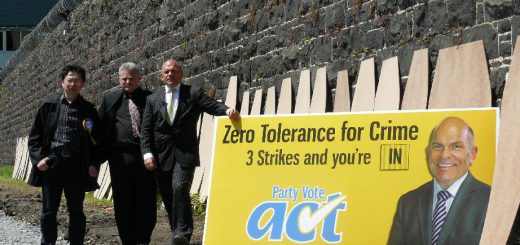Has John Banks breached the Act Party constitution and rules?
This blog post was originally published at Liberation
Currently the Act Party is attempting to distance itself from the ‘banks.com’ scandal engulfing its leader. For example after the Dotcom donation allegations became known, Act Party president Chris Simmons told the New Zealand Herald ‘There’s a bit of a beat-up going on. It was all to do with the mayoral campaign. It doesn’t have anything to do with Act’. But in practical terms, it has become fairly clear that anything to do with John Banks has in fact a great deal to do with Act, given that he is now their sole MP. In this guest blog post, Act-watcher Geoffrey Miller asks whether Banks has formally violated party rules?
The candidate screening process
Political parties make a point of vetting candidates for their suitability. The reason for this is obvious: candidates act as ambassadors for the party as a whole. Anything that candidates do can reflect positively, or negatively, on the party at large.
The general thrust of Act’s rules is full transparency and disclosure. According to the Act Party constitution and rules (available online at the Electoral Commission in this PDF), aspiring candidates must fulfil the following (Section 20.2):
Each Applicant shall provide full details of his or her background, education, achievements, previous political activities, and other relevant personal information in a form determined by the Board from time to time.
Disclosure of information that would embarrass the party
More specifically, candidates must advise of anything untoward in their past that could embarrass the party in future. Section 20.3, Candidates Register, reads:
Each Applicant shall be under a duty to disclose in writing to any two of the President, Vice President, Leader or Deputy Leader, without specific request, immediately it becomes known to the Applicant, any information which is adverse to him or her which would embarrass the Party upon public disclosure, or which may render him or her unfit to be a Candidate.
As an Act member of parliament, John Banks remains on the Candidates Register. Banks is the party leader. This means he would have needed to advise two of John Boscawen (deputy leader), Chris Simmons (party president) or Barbara Astill (vice president) if he had “any information which is adverse to him…which would embarrass the Party”.
The threshold at which information becomes “adverse” is of course debateable. But even if Banks believes the donations from Dotcom to his 2010 Auckland mayoral campaign were anonymous, it could be argued that Banks should have disclosed at least his apparent close friendship with Kim Dotcom to the Act Party board after Dotcom was arrested in an enormously high profile police raid in January 2012.
Sanctions
What is the punishment for not disclosing relevant information? Section 20.6 reads:
The duty to volunteer disclosure under Rule 20.2 extends throughout any period in which a Member is a Potential Candidate or a Candidate or a Member of Parliament. Any Candidate or Potential Candidate who fails to disclose under Rule 20.2 or this Rule, or otherwise provides misleading or incorrect information shall be liable to have his or her name removed from the Candidates Register at any time thereafter and shall be liable to expulsion from the Party.
Comparison with David Garrett
An interesting comparison is former Act MP David Garrett, who resigned in September 2010 after his actions involving identity theft in the 1980s, before he became an MP, became known. However, while voters were unaware of Garrett’s chequered past, the party’s leadership had been aware since the outset of Garrett’s brush with the law. In December 2011, Garrett told the Sunday Star-Times that he had revealed his past at selection time:
There was a meeting attended by Roger Douglas, Heather Roy, John Boscawen, and a board member at which I was asked if I had skeletons in my closet. I said `yes a big f—— rattling one’.
Garrett resigned before he was pushed. At the time of his resignation, he seemed keen to put his party first and expressed concern at the potential impact on the Act Party:
As a result of my own actions, my political career is almost certainly over, but that is not my greatest concern.
My second major regret is the damage I have caused to the ACT Party, which has a very important role to play in parliament.
What did and does the Act Party board know about John Banks?
The communications between Banks and the party’s board remain private. What is clear, however, is that the Act Party’s own constitution and rules make it clear that a candidate’s and MP’s past may very well have a lot to do with the Act Party itself.
What has John Banks told, and what is John Banks telling his party’s own board?
